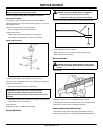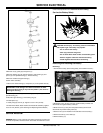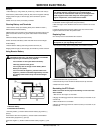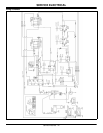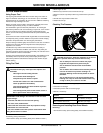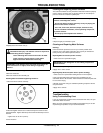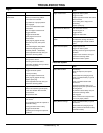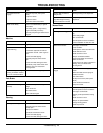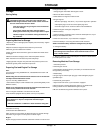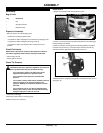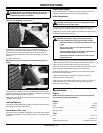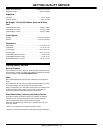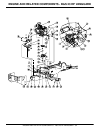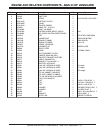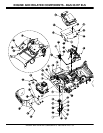
Storage - 47
STORAGE
Storage
Storing Safety
Preparing Machine for Storage
1.Repair any worn or damaged parts. Replace parts if necessary. Tighten
loose hardware.
2.Repair scratched or chipped metal surfaces to prevent rust.
3.Remove grass and debris from machine.
4.Clean under the deck and remove grass and debris from inside chute
and bagger.
5.Wash the machine and apply wax to metal and plastic surfaces.
6.Run machine for five minutes to dry belts and pulleys.
7.Apply light coat of engine oil to pivot and wear points to prevent rust.
8.Lubricate grease points and check tire pressure.
Preparing Fuel and Engine For Storage
Fuel:
If you have been using “Stabilized Fuel,” add stabilized fuel to tank until
the tank is full.
NOTE: Filling the fuel tank reduces the amount of air in the fuel tank
and helps reduce deterioration of fuel.
If you are not using “Stabilized Fuel:”
1.Park machine safely in a well-ventilated area. (See Parking Safely in the
SAFETY section.)
NOTE: Try to anticipate the last time the machine will be used for the
season so very little fuel is left in the fuel tank.
2.Turn on engine and allow to run until it runs out of fuel.
3.For machines equipped with key switch, turn key to off position.
4.Mix fresh fuel and fuel stabilizer in separate container. Follow stabilizer
instructions for mixing.
5.Fill fuel tank with stabilized fuel.
6.Run engine for a few minutes to allow fuel mixture to circulate through
carburetor on gas engine or fuel injectors on diesel engine.
Engine:
Engine storage procedure should be used when vehicle is not to be used
for longer than 60 days.
1.Change engine oil and filter while engine is warm.
2.Service air filter if necessary.
3.Clean debris from engine air intake screen.
4.On gas engines:
• Remove spark plugs. Put 30 mL (1 oz) of clean engine oil in cylinders.
• Install spark plugs, but do not connect spark plug wires.
• Crank the engine five or six times to allow oil to be distributed.
5.Clean the engine and engine compartment.
6.Remove battery.
7.Clean the battery and battery posts. Check the electrolyte level, if your
battery is not maintenance free.
8.Close fuel shut-off valve, if your machine is equipped.
9. Store the battery in a cool, dry place where it will not freeze.
NOTE: The stored battery should be recharged every 90 days.
10. Charge the battery.
11. Store the vehicle in a dry, protected place. If vehicle is stored outside,
put a waterproof cover over it.
Removing Machine From Storage
1.Check tire pressure.
2.Check engine oil level.
3.Check battery electrolyte level, if your battery is not maintenance free.
Charge battery if necessary.
4.Install battery.
5.On gas engines: Check spark plug gap. Install and tighten plugs to
specified torque.
6.Lubricate all grease points.
7.Open fuel shut-off valve, if your machine is equipped.
8.Run the engine 5 minutes without the mower or any attachments
running to allow oil to be distributed throughout engine.
9.Be sure all shields and guards or deflectors are in place.
CAUTION: Avoid injury! Fuel vapors are explosive and
flammable. Engine exhaust fumes contain carbon monoxide
and can cause serious illness or death:
•Run the engine only long enough to move the machine
to or from storage.
•Do not store vehicle with fuel in the tank inside a
building where fumes may reach an open flame or spark.
•Allow the engine to cool before storing the machine in
any enclosure.
IMPORTANT: Avoid damage! Stale fuel can produce varnish and
plug carburetor or injector components and affect engine
performance.
• Add fuel conditioner or stabilizer to fresh fuel before filling tank.
IMPORTANT: Avoid damage! Prolonged exposure to sunlight
could damage the hood surface. Store machine inside or use a
cover if stored outside.



